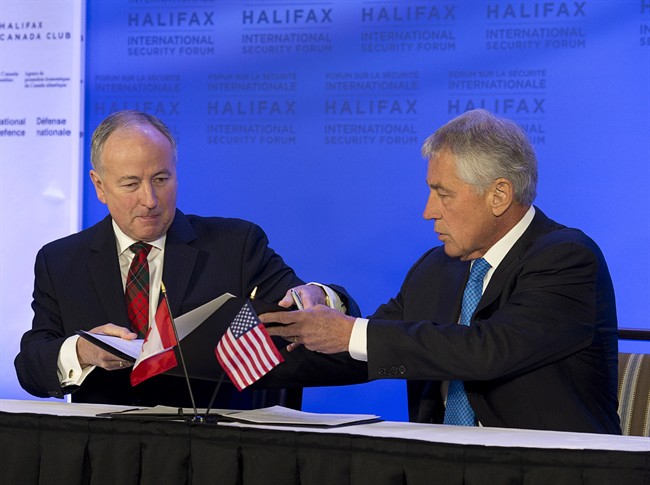HALIFAX – Canada’s defence minister and his counterpart in the U.S. expressed concerns Friday about whether Afghanistan will sign a security deal to keep 8,000 U.S. troops in the country over the next decade.

Chuck Hagel, the U.S. Secretary of Defense, said during the Halifax International Security Form that he needs the deal signed and ratified by the Afghan parliament before he recommends to President Barack Obama that U.S. military members continue to risk their lives there.
“Without a clear agreement it will be difficult for us to plan, and our partners to plan, what would be the acceptable role,” Hagel said.
The Americans are trying to work out an agreement with Afghanistan that would lay out how the U.S. military would operate there after next year.
Afghan President Hamid Karzai urged tribal elders on Thursday to approve a security pact with Washington that keeps U.S. troops in Afghanistan until 2024. But he said he will leave it to his successor to sign the deal after the country’s elections on April 5 — a move that has stunned the U.S.
Karzai’s speech to the 2,500 members of a consultative council known as the Loya Jirga were made as Obama made a plea for quick passage of the agreement in a letter promising to respect Afghanistan’s sovereignty and only raid homes when U.S. lives are at risk.
Senior U.S. military officials have said Afghan forces require three to four years of training if they’re to continue fighting off a Taliban insurgency that shows no sign of surrendering.
The exit of all foreign forces without an agreement would raise questions about the more than $8 billion by western countries that has been pledged annually to fund Afghan security forces and help with the country’s development after 2014.
Canada has committed $100 million annually to support the Afghan military after it ends its training mission there in March.
Federal Defence Minister Rob Nicholson said he is also concerned about the negotiations between U.S. officials and Karzai.
“We’re very interested, very concerned about what’s taking place there,” Nicholson said. “We’re watching very carefully the developments in Afghanistan with respect to the negotiations on a bilateral security agreement.”
During a keynote speech at the conference later in the day, Hagel also said America will protect its sovereignty in the Arctic as climate change increases the amount of navigable water around its coastlines off Alaska.
He said energy exploration in the largely untapped Arctic region could heighten international tensions, but countries must work together to avoid conflict.
“Throughout human history mankind has raced to discover the new frontier and time after time discovery was swiftly followed by new conflict. We cannot erase this history, but we can ensure this history doesn’t repeat itself in the Arctic.”
He also said the U.S. is planning long-term military plans for the Arctic, even as it struggles with budget restraint.
Earlier in the day, Hagel and Nicholson signed a bilateral agreement to share information about their countries’ military activities in the Asia Pacific region, a deal the American defence leader said reflects a shift of his country’s military and economic priorities.
“Like the United States, Canada is a Pacific nation and in light of America’s ongoing rebalance to the Asia Pacific, we both benefit by working together,” Hagel said.
He said there will be an annual meeting between senior military leaders from both nations about operations in the Asia Pacific.
Nicholson said the deal will help avoid overlap when providing disaster relief in cases such as the response to typhoon Haiyan in the Philippines.



Comments